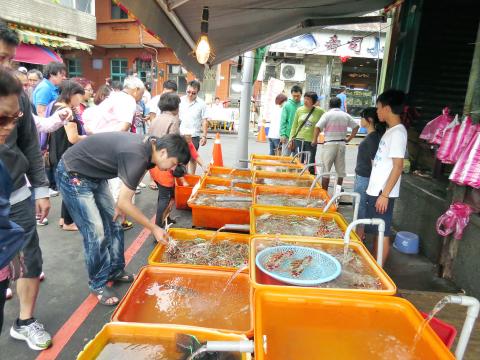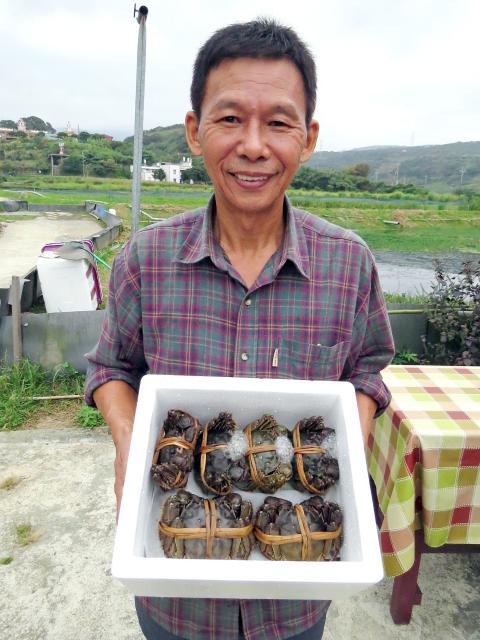As crab season has arrived in Taiwan, Lai Hui-lien (賴卉蓮), a physician at the Ministry of Health and Welfare’s Keelung Hospital, is urging members of the public to show restraint.
Crab meat is very rich in protein, which means it is not healthy to eat too much of it, Lai said, especially people who suffer from hypertension or cardiovascular diseases.
People with gout or skin allergies should avoid crab completely, she said.

Photo: Yu Chao-fu, Taipei Times
Deemed to be “cold” in terms of Chinese medicine, crabs should not be eaten alongside with beer and pears, Lai said.
Crab season coincides with persimmon season, but the two do not go together, as the protein in crab meat can coagulate with the tannin in persimmon and lead to indigestion, which can cause food in the intestines to ferment and lead to stomach pains and diarrhea, the doctor said.
It is not just consumers who look forward to crab season every year, the nation’s fishermen do too.

Photo: Yu Chao-fu, Taipei Times
Fishermen say that Taiwanese crabs fall into two categories: those born in captivity — mainly Chinese Mitten crabs — and wild crabs such as the stone crabs found off New Taipei City’s Wanli District (萬里).
Wanli is one of the top four ports nationwide for crab cuisine — a distinction it shares with the city’s Yehliu (野柳) and Gueihung (龜吼) districts and Dongao (東澳) in Yilan County.
However, the popularity of crabs in Wanli has led to a significant hike in prices.
Local business operator Lu Feng-e (呂鳳娥) said crabs and crab dishes in Wanli are now a lot more expensive than they are in Keelung, about a half-hour drive away.
His advice to customers it to try to select fresh crabs by observing their “liveliness.”
Chiang Ching-shu (江慶樹) owns the Chingshan Chinese Mitten Crab farm in New Taipei City’s Shihmen District (石門) and he said the quality of crabs bred at his farm are the result of a lot of work and top quality feed.
There are seven ponds on his farm, spread across 3,000 ping (9,917.37m2) of land and filled with mountain water from Yangmingshan (陽明山), he said. His crabs are fed mackerel, corn, wheat and silver-stripe round herring for 10 months, but no antibacterial medicines or growth hormones are used.
The farm sends a sample of its crabs to the SGS Co and the New Taipei City Department of Agriculture for inspection before sales commence each year, Chiang said.
The meat from male Chinese mitten crabs is more tender, while the females allow gourmands to enjoy both the meat and eggs, Chiang said.
If consumers want to pick up the freshest crabs, they should look for bubbles in the water, and buy from local vendors, he said.
The going prices are: for six crabs totaling 1kg, NT$2,000; five crabs totaling 1kg, NT2,400 and four crabs totaling 1kg,NT$2,800, Chiang said.

The Ministry of Economic Affairs has fined Taobao NT$1.2 million (US$36,912) for advertisements that exceed its approved business scope, requiring the Chinese e-commerce platform to make corrections in the first half of this year or its license may be revoked. Lawmakers have called for stricter enforcement of Chinese e-commerce platforms and measures to prevent China from laundering its goods through Taiwan in response to US President Donald Trump’s heavy tariffs on China. The Legislative Yuan’s Finance Committee met today to discuss policies to prevent China from dumping goods in Taiwan, inviting government agencies to report. Democratic Progressive Party Legislator Kuo Kuo-wen (郭國文) said

The Ministry of Economic Affairs has fined Taobao NT$1.2 million (US$36,900) for advertisements that exceeded its approved business scope and ordered the Chinese e-commerce platform to make corrections in the first half of this year or its license would be revoked. Lawmakers have called for stricter supervision of Chinese e-commerce platforms and more stringent measures to prevent China from laundering its goods through Taiwan as US President Donald Trump’s administration cracks down on origin laundering. The legislature’s Finance Committee yesterday met to discuss policies to prevent China from dumping goods in Taiwan, inviting government agencies to report on the matter. Democratic Progressive Party

Taiwan and its Pacific ally Tuvalu on Tuesday signed two accords aimed at facilitating bilateral cooperation on labor affairs, according to Taiwan’s Ministry of Foreign Affairs (MOFA). The governments inked two agreements in Taipei, witnessed by Foreign Minister Lin Chia-lung (林佳龍) and visiting Deputy Tuvaluan Prime Minister Panapasi Nelesone, MOFA said in a news release. According to MOFA, the agreements will facilitate cooperation on labor issues and allow the two sides to mutually recognize seafarers’ certificates and related training. Taiwan would also continue to collaborate with Tuvalu across various fields to promote economic prosperity as well as the well-being of their

Sung Chien-liang (宋建樑), who led efforts to recall Democratic Progressive Party (DPP) Legislator Lee Kun-cheng (李坤城), was released on bail of NT$80,000 today amid outcry over his decision to wear a Nazi armband to questioning the night before. Sung arrived at the New Taipei District Prosecutors’ Office for questioning in a recall petition forgery case last night wearing a red armband bearing a swastika, carrying a copy of Adolf Hitler’s Mein Kampf and giving a Nazi salute. Sung left the building at 1:15am without the armband and covering the book with his coat. Lee said today that this is a serious